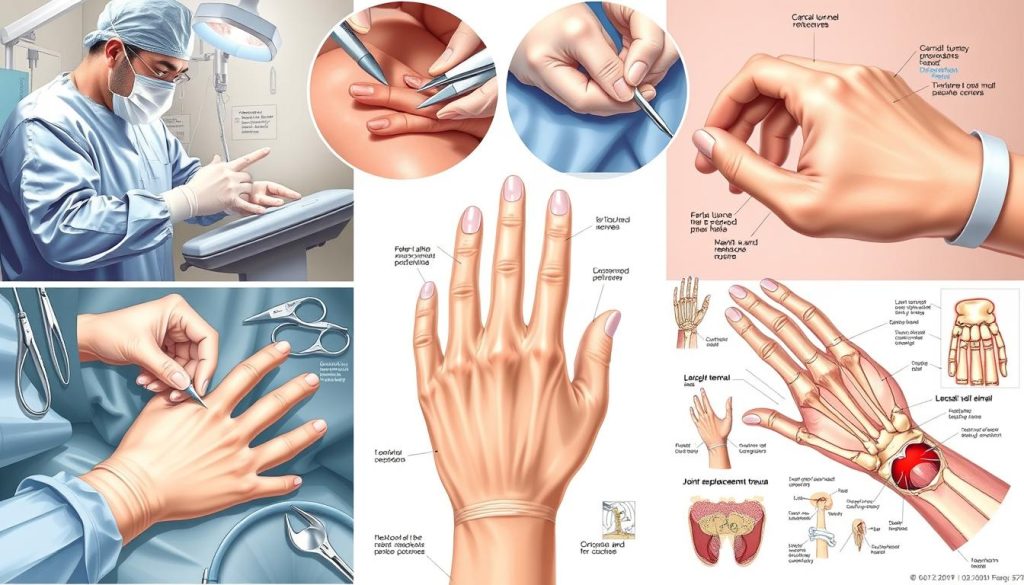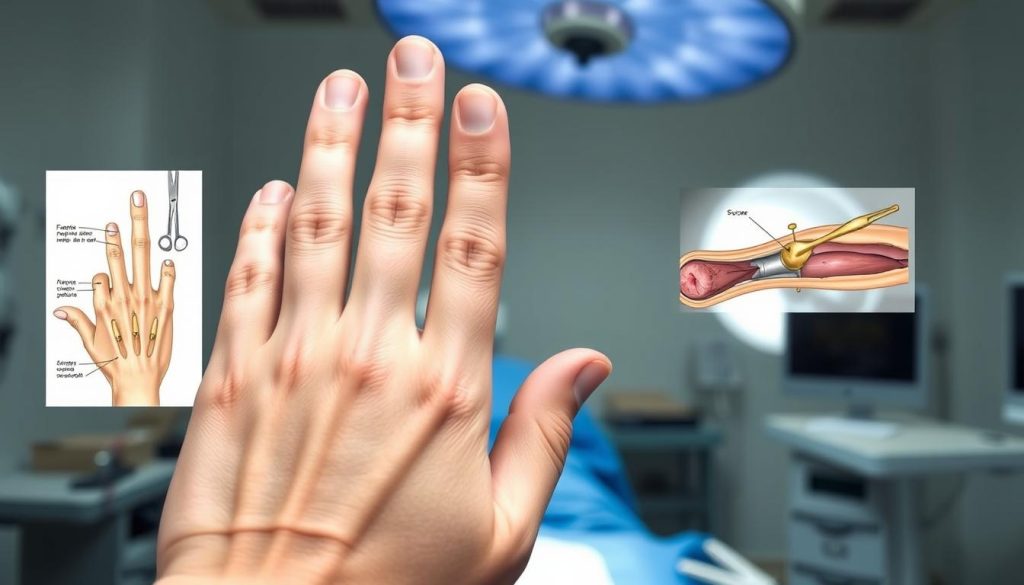Hand surgery is a key medical field that deals with many hand and wrist issues. It helps with problems like carpal tunnel syndrome and severe injuries. People often wonder about the different surgeries, how long it takes to recover, and what to expect during the process.
Our hands play a huge role in our daily lives. Hand surgeries can greatly improve life for those with serious conditions. These surgeries can treat arthritis, fix tendons, and help with nerve problems like carpal tunnel syndrome. They offer hope for better hand mobility and less pain.
This guide will look at different hand surgery types, recovery times, and what to expect during these procedures. Knowing the journey from diagnosis to aftercare helps people make better choices about their hand health and treatment.
Understanding Hand Surgery: A Comprehensive Overview
Hand surgery is a special field that deals with many hand and wrist issues. It helps fix injuries and correct birth defects. This field is key in making hands work better and improving life quality.
Common Reasons for Hand Surgery
There are many reasons why someone might need hand surgery:
- Traumatic injuries
- Carpal tunnel syndrome
- Arthritis
- Tendon or ligament damage
- Congenital hand deformities

When Surgery Becomes Necessary
Surgery is often the best choice when other treatments don’t work. You might need surgery if you have:
- Persistent pain
- Decreased mobility
- Loss of hand function that affects daily life
Role of Hand Surgeons in Treatment
Hand surgeons are skilled in diagnosing and treating hand problems. They perform precise surgeries, including:
| Procedure | Purpose |
|---|---|
| Microsurgery | Repair of small blood vessels and nerves |
| Tendon repair | Restoration of hand movement |
| Joint reconstruction | Treatment of arthritis and injuries |
| Congenital deformity correction | Improvement of hand function and appearance |
Hand surgeons work with patients to create treatment plans. They aim for the best results for each case.
Types of Hand Surgery Procedures
Hand surgery covers a wide range of procedures. They aim to fix various hand and wrist issues. These surgeries help restore function and enhance life quality.

Reconstructive procedures are a big part of hand surgery. They fix damaged tissues like tendons, nerves, or blood vessels. In some cases, surgeons might remove a finger to prevent more problems or to improve hand function.
Joint replacements are also common. These surgeries help those with arthritis or other degenerative conditions. They replace damaged joints with artificial ones, easing pain and boosting mobility.
Microsurgery techniques are key in many hand surgeries. Surgeons use special tools and microscopes. This allows them to repair tiny structures in the hand with great precision.
| Procedure Type | Common Indications | Recovery Time |
|---|---|---|
| Tendon Repair | Cuts, sports injuries | 6-12 weeks |
| Carpal Tunnel Release | Nerve compression | 4-6 weeks |
| Finger Amputation | Severe trauma, infection | 4-8 weeks |
| Joint Replacement | Arthritis | 3-4 months |
Each hand surgery type needs specific skills and methods. Patients should talk to experienced hand surgeons. This helps find the best procedure for their condition.
Carpal Tunnel Release Surgery
Carpal tunnel syndrome is a common issue that causes pain and numbness in the hand and wrist. If other treatments don’t work, surgery is needed. This surgery relieves pressure on the median nerve, helping those with this condition.
Open vs. Endoscopic Techniques
There are two main ways to do carpal tunnel release surgery: open and endoscopic. Each method has its own advantages and things to consider.
| Technique | Incision Size | Recovery Time | Visibility |
|---|---|---|---|
| Open | 2-3 inches | 4-6 weeks | Direct view |
| Endoscopic | 1-2 small incisions | 1-2 weeks | Camera-assisted |
Pre-operative Preparations
Before surgery, patients must do several things:
- Stop taking blood-thinning medications
- Fast for 8-12 hours before surgery
- Arrange for transportation home
- Prepare a recovery area at home
Post-operative Care Requirements
After surgery, it’s important to follow certain steps for recovery. Patients should:
- Keep the surgical site clean and dry
- Elevate the hand to reduce swelling
- Take prescribed pain medications as directed
- Perform gentle exercises as recommended by the surgeon

By following these care instructions, patients can have a smooth recovery. This ensures the surgery’s benefits are fully enjoyed.
Treatment for Dupuytren’s Contracture
Dupuytren’s contracture is a hand condition that affects the connective tissue in the palm. It causes the fingers to bend inward, limiting hand function. When it gets worse, hand surgery is often needed.

Surgical options include fasciectomy and needle aponeurotomy. Fasciectomy removes the affected tissue. Needle aponeurotomy uses a needle to divide the contracture. Both aim to improve hand mobility and function.
For milder cases, non-surgical treatments are available. These include steroid injections and enzyme injections to break down the tissue. Physical therapy and splinting can also help in early stages.
| Treatment | Procedure | Best for |
|---|---|---|
| Fasciectomy | Removal of affected tissue | Severe contractures |
| Needle Aponeurotomy | Division of contracture with needle | Mild to moderate cases |
| Enzyme Injections | Injection to break down tissue | Early-stage contractures |
Choosing the right treatment depends on the contracture’s severity and the patient’s needs. A hand surgeon can assess and recommend the best option for each case.
Surgical Solutions for Trigger Finger
Trigger finger affects the hand’s tendons, causing pain and limiting finger movement. When conservative treatments fail, hand surgery becomes a viable option. Let’s explore the journey from diagnosis to treatment for this common condition.

Diagnostic Process
Doctors diagnose trigger finger through physical exams and patient history. They check for finger stiffness, clicking, and locking. In some cases, imaging tests like ultrasounds help confirm the diagnosis and rule out other issues.
Surgical Techniques
The main surgical approach for trigger finger is tendon sheath release. This hand surgery procedure involves making a small cut in the affected finger to open the constricted tendon sheath. It allows the tendon to move freely again, relieving symptoms and restoring function.
Alternative Treatment Options
Before considering surgery, doctors often recommend non-surgical treatments for trigger finger. These include:
- Rest and activity modification
- Splinting the affected finger
- Anti-inflammatory medications
- Corticosteroid injections
These methods can be effective for mild cases, but persistent symptoms may require surgical intervention. Discussing all options with a hand specialist ensures the best treatment plan for each patient’s unique situation.
Arthritis Management Through Surgery
Arthritis in the hand can make everyday tasks hard. If other treatments don’t work, surgery might be needed. It helps manage symptoms and improve hand function.
Osteoarthritis and rheumatoid arthritis often affect the hand. Surgery aims to lessen pain and boost movement. Joint fusion makes bones stable but limits movement.
Joint replacement surgery removes damaged joints and puts in artificial ones. This keeps movement possible.
Tendon transfers move healthy tendons to help weak ones. This can bring back lost hand function. Surgery is needed when pain doesn’t go away with medicine and therapy, or when joints deform.
After surgery, many people feel less pain and can use their hands better. Recovery includes physical therapy to build strength and dexterity. Surgery is not a cure but can help manage symptoms, making daily activities easier.
“Hand surgery has given me back the ability to do things I love, like gardening and crafting. It’s not perfect, but the improvement is remarkable.” – Sarah, arthritis patient
Talking to a hand surgeon is key to finding the right surgery for hand arthritis. They look at age, lifestyle, and how bad the condition is to suggest treatments.
Tendon Repair and Reconstruction
Tendon repair is a key part of hand surgery. It fixes damaged tendons to help hands work again. Tendons can get hurt from cuts, sports accidents, or too much use.
Types of Tendon Injuries
Tendon injuries in the hand can happen in different ways:
- Cuts: Sharp objects can sever tendons
- Ruptures: Sudden force can cause tendons to tear
- Inflammations: Overuse can lead to tendon swelling
Surgical Approaches
Hand surgeons use different ways to fix tendons:
| Approach | Description | Best for |
|---|---|---|
| Primary Repair | Directly stitching torn ends | Recent, clean cuts |
| Tendon Grafts | Using tissue from another part of body | Large gaps in tendon |
| Tendon Transfers | Rerouting a working tendon | Irreparable tendon damage |
Rehabilitation Process
Getting better after tendon repair is important. Physical therapy starts right after surgery. It includes easy exercises to avoid stiffness.
As healing goes on, stronger exercises are added. It can take months to fully recover, based on the injury’s severity.
“Patience and dedication to rehab are key for successful tendon repair outcomes.”
Microsurgery Techniques in Hand Procedures
Microsurgery has changed hand surgery, making it more precise. It uses special tools and magnification to work on tiny blood vessels and nerves.
In hand surgery, microsurgery is very important. It helps surgeons reattach fingers, fix damaged nerves, and move tissue to fix hand parts. This makes hands work better and look nicer.
Microsurgery lets surgeons work on things as small as 1 millimeter. This precision means patients recover faster and have better results. Surgeons use powerful microscopes and very fine instruments to do this.
“Microsurgery has revolutionized our approach to complex hand injuries, allowing us to save and restore function in cases that were once considered hopeless.”
But, microsurgery in hand surgery needs a lot of training and skill. Surgeons must have steady hands, good eye-hand coordination, and know a lot about hand anatomy. These operations can take a long time, sometimes hours.
As microsurgery gets better, patients will see even better results from hand surgery. These new techniques give hope to those with severe hand injuries or complex needs.
Recovery Timeline and Rehabilitation
Recovering from hand surgery is a journey that varies for everyone. Knowing what to expect can help you prepare and improve your recovery. We’ll look at the main stages of getting better after hand surgery, including wrist fracture care.
Immediate Post-operative Care
After surgery, your main goal is to manage pain and protect the area. You’ll likely wear a bandage or splint to keep it stable. Elevating the area helps reduce swelling.
Your doctor might give you pain meds and antibiotics to avoid infection.
Physical Therapy Requirements
Physical therapy is key in recovering from hand surgery. Your therapist will teach you exercises to boost flexibility, strength, and function. For wrist fractures, therapy starts with simple exercises and then moves to strengthening.
| Recovery Phase | Timeline | Activities |
|---|---|---|
| Early | 1-2 weeks | Rest, elevation, wound care |
| Intermediate | 2-6 weeks | Gentle exercises, scar management |
| Advanced | 6-12 weeks | Strengthening, return to daily activities |
Long-term Recovery Expectations
Recovering fully from hand surgery can take months. For wrist fractures, it might take 3-6 months to get back to full strength. Being patient and sticking to your rehab plan is essential for the best results.
Keep in mind, every hand surgery is unique. Your surgeon and physical therapist will create a recovery plan just for you, based on your needs and the surgery you had.
Potential Risks and Complications
Hand surgery can change lives, but it also comes with risks. Knowing these risks helps patients make better choices and get ready for recovery.
Some common risks include infection, nerve damage, and stiffness. These can happen in many surgeries, from simple carpal tunnel releases to complex repairs for birth defects. Doctors do a lot to prevent these problems, but patients also have a big role.
- Infection: Can be reduced through proper wound care
- Nerve damage: May lead to numbness or weakness
- Stiffness: Often addressed with post-operative therapy
For surgeries on birth defects, there are extra things to think about. These surgeries might need to be done in stages and have their own risks. Fixing the shape of growing hands is very complex and needs special skills.
To avoid problems, patients should follow their doctor’s advice before and after surgery. This includes taking medicine, taking care of the wound, and going to all follow-up visits. Catching issues early can make a big difference in how well you recover.
“Understanding the risks associated with hand surgery empowers patients to actively participate in their care and recovery process.”
By working with their doctor and care team, patients can face hand surgery challenges with more confidence. This teamwork is essential for the best results and to reduce risks.
Pre-operative Preparation Guidelines
Getting ready for hand surgery needs careful planning. Patients must follow specific guidelines for a successful procedure and smooth recovery. This is true for all hand surgeries, including those for carpal tunnel syndrome.
Required Medical Tests
Doctors often order several tests before hand surgery. These include blood work to check overall health and imaging studies like X-rays or MRIs. For carpal tunnel syndrome surgery, nerve conduction studies are common to assess nerve function.
Medication Adjustments
Patients might need to stop or change some medications before surgery. Blood thinners usually need to be paused. Pain relievers like aspirin should be avoided as they can increase bleeding risk. Always consult your doctor about your current medications.
Lifestyle Modifications
Certain lifestyle changes can improve surgery outcomes. Quitting smoking is key as it can hinder healing. A healthy diet supports recovery. For carpal tunnel syndrome patients, reducing repetitive hand motions before surgery may help reduce symptoms.
- Stop smoking at least two weeks before surgery
- Eat a balanced diet rich in nutrients
- Arrange for post-surgery care and transportation
- Prepare your home for easier post-surgery living
Following these guidelines ensures you’re fully prepared for hand surgery. Proper preparation can lead to better outcomes and faster recovery times.
Post-operative Care and Pain Management
After hand surgery, it’s important to take good care of yourself. Keeping the area clean and dry helps prevent infection. Your doctor will tell you how to change dressings and watch the wound.
Managing pain is also key. Doctors might give you medicine to help with the pain. Ice packs can also reduce swelling and pain.
Trigger finger surgery might cause some pain for a few days. Doing gentle exercises can help your finger move better. Avoid heavy lifting or hard activities when you’re first recovering.
“Listen to your body and don’t push too hard, too fast. Gradual progress is key to a successful recovery after hand surgery.”
During early recovery, you might notice:
- Swelling
- Stiffness
- Limited range of motion
If you have:
- Increased pain
- Signs of infection
- Excessive bleeding
| Recovery Phase | Activities | Pain Level |
|---|---|---|
| Week 1-2 | Rest, wound care | Moderate to high |
| Week 3-4 | Gentle exercises | Mild to moderate |
| Week 5-6 | Increased activity | Minimal |
Hand Therapy and Rehabilitation Exercises
Rehabilitation is key after hand surgery or tendon repair. A good therapy program helps patients regain strength and function in their hands.
Early Motion Protocols
Early motion starts soon after surgery. It helps prevent stiffness and promotes healing. Patients start with passive exercises, then move to active ones as they heal.
Strengthening Exercises
Strengthening exercises are important as recovery goes on. These include:
- Finger flexion and extension
- Grip strengthening with putty or stress balls
- Wrist rotations and curls
- Thumb opposition exercises
The exercises depend on the surgery and the patient’s needs. A hand therapist makes sure the program is right for each person.
Return to Daily Activities
Getting back to daily activities is a big part of rehab. It involves learning to do tasks again while protecting the hand. Patients start with simple tools and gradually do more complex tasks.
Rehab after hand surgery or tendon repair takes time and effort. With hard work and help from professionals, most people see big improvements in their hand function and life quality.
Success Rates and Long-term Outcomes
Hand surgery success rates vary based on the procedure and patient factors. For carpal tunnel release, studies show improvement in 75-90% of cases. Tendon repair surgeries boast success rates of 70-80%, with patients regaining significant function. Arthritis of the hand, treated surgically, sees pain reduction in 80-90% of patients.
Long-term outcomes for hand surgery depend on several factors. Age, overall health, and adherence to post-operative care play critical roles. Younger patients often experience faster recovery and better long-term results. Proper rehabilitation is key to achieving optimal outcomes.
For arthritis of the hand, surgical interventions provide lasting relief. Joint replacement surgeries offer pain reduction and improved function for 10-15 years in most cases. Fusion procedures, while limiting motion, deliver permanent pain relief for severe arthritis.
| Procedure | Success Rate | Long-term Outcome |
|---|---|---|
| Carpal Tunnel Release | 75-90% | Symptom relief for 5-10 years |
| Tendon Repair | 70-80% | Improved function for life |
| Arthritis Treatment | 80-90% | Pain reduction for 10-15 years |
Patient satisfaction rates for hand surgery are generally high. Most individuals report improved quality of life and ability to perform daily tasks. Complications, while rare, can impact outcomes. Infection rates are low, typically less than 1% for most hand surgeries.
Choosing the Right Hand Surgeon
Finding the best hand surgeon is key to a successful surgery. Look for a board-certified expert with experience in your procedure. This is very important for complex surgeries like finger amputation.
Do your research by checking their credentials and reading patient reviews. This will help you make a good choice.
Set up meetings with your top choices. Ask about their experience with hand surgery and how they’ll handle your case. It’s important to feel comfortable and have your questions answered.
Good communication is essential. You should feel free to talk about your goals and concerns. Ask about recovery times, risks, and expected results. Trust your gut and pick a surgeon who makes you feel confident.
FAQ
Q: What are the most common types of hand surgery?
A: Common hand surgeries include carpal tunnel release and trigger finger release. Dupuytren’s contracture treatment and tendon repair are also common. Joint replacement for arthritis and microsurgery for complex injuries or congenital deformities are other types.
Q: How long is the typical recovery period after hand surgery?
A: Recovery time varies. It can be a few weeks for minor procedures or several months for complex ones. Full recovery and return to activities may take 3-6 months or longer.
Q: What should I expect during the pre-operative preparation for hand surgery?
A: Expect medical tests, medication adjustments, and lifestyle changes. You might need blood work, imaging studies, and a physical exam. Your surgeon will tell you which medications to stop or continue. They may also ask you to quit smoking and adjust your diet.
Q: How is pain managed after hand surgery?
A: Pain management includes prescription pain meds, over-the-counter analgesics, and non-pharmaceutical methods. These include elevation, ice therapy, and gentle exercises. Your surgeon will tailor a plan to your needs and surgery type.
Q: When can I return to work after hand surgery?
A: Return to work depends on the surgery type, job requirements, and your recovery. For minor procedures, you might return to light duty work in a few days or weeks. More complex surgeries may take several weeks or months. Your surgeon will guide you based on your situation.
Q: What are the possible risks and complications of hand surgery?
A: Risks include infection, nerve damage, stiffness, scarring, and in rare cases, loss of function. The specific risks depend on the surgery type. Your surgeon will discuss these during your consultation.
Q: How important is hand therapy after surgery?
A: Hand therapy is key for recovery after most surgeries. It prevents stiffness, improves range of motion, increases strength, and restores function. Your surgeon will prescribe a program that may start soon after surgery and last several weeks or months.
Q: What factors influence the success of hand surgery?
A: Success depends on the condition, surgical technique, surgeon’s expertise, patient’s health, post-operative instructions, and rehabilitation. Following your surgeon’s advice and actively participating in your recovery can improve outcomes.
Q: How do I choose the right hand surgeon?
A: Look for board-certified specialists with experience in your procedure. Research their credentials, read patient reviews, and schedule consultations. It’s important to feel comfortable with your surgeon and confident in their ability to meet your needs.
Q: Are there non-surgical alternatives to hand surgery?
A: Yes, non-surgical options include medications, steroid injections, splinting, physical therapy, and lifestyle changes. Surgery may be the best option for some conditions. Your hand specialist will discuss all options with you.


















